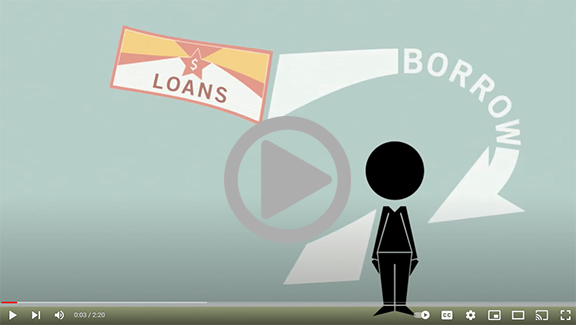Student Loans: Borrow Smart
A college education is an investment in your future. Used wisely, student loans are a tool to help you finance your education. Student loans can help cover the costs of attending college, so you can earn your degree and transition into a better paying career. MSUB encourages students and families to be educated borrowers of student and parent loans.
To review loans or contact your loan servicer(s), log in at StudentAid.gov/login. Click on loans to find your loan servicer(s) contact information. For help understanding
loans or repayment, call Financial Education at 406-247-3004 or email finaid@msubillings.edu.
 How to Apply for Federal Student Loans
How to Apply for Federal Student Loans
While not a loan application, the FAFSA can qualify you for low interest federal student loans to help you cover the costs of college. Loans are available for both undergraduate and graduate students. Some families of dependent students may also be offered a ParentPlus loan (see below for more information).
There is no income cap for FAFSA. Some aid, including unsubsidized student loans, is not need-based.
As with other financial aid, student loans are first applied toward the student’s MSUB bill (student account) first. Any money left over after the bill is paid is sent to the student to pay for books or other educational expenses.
Eligibility for Loans
In order to be eligible to receive a federal student loan, you must:
- Meet general eligibility requirements for aid
- Be enrolled in at least 6 credits
- Be making satisfactory academic progress (SAP) for financial aid, whether you have received financial aid before or not.
- Financial aid standards are different than regular academic standards. For example, excess attempted credits (such as too many W grades or changing your major late in your degree program) can affect financial aid eligibility.
- New borrowers must complete Entrance Counseling and sign a loan agreement (Master Promissory Note/MPN) at StudentLoans.gov before loans can be disbursed.
- For information on the types of loans available, as well as current loan limits, visit the Financial Aid Office Student Loans page.
Take Federal Student Loans Before Private
If you need to borrow money to help pay for school, take out federal student loans from FAFSA first. Only take out alternative or private student loans from banks after exhausting all your FAFSA eligibility.
- Federal student loans have a low, fixed interest rate and no credit-check for students.
- You do not have to make payments while in school at least half-time, including graduate school.
- You can make payments at any time and there is no penalty to pay off the loan early. Students with unsubsidized loans can make voluntary interest-only payments while in school, to keep their debt manageable.
- After you drop below 6 credits (including when you leave school or graduate), you get a one-time 6-month grace period before you have to start making payments.
- There are flexible repayment options. You can postpone payments if you lose your job or experience a financial hardship.
- The payments are affordable. You can get a reduced payment based on income. Payments can be as low a $0.
- Making required payments on time builds credit
Be Responsible about Borrowing
If you have no other way to pay for school, or are working so much you can’t pass
the classes you paid for, a strategic loan that helps you finish your degree and get
a better-paying job could be a good investment in your future.
Invest Wisely:
- Loans can be useful tool to help finance your education, but you want to be responsible. Student and Parent Loans are financial aid you have to pay back with interest.
- Go for the free money first. Apply for scholarships. Scholarships do not have to repaid. There are scholarships based on financial need, and scholarships based on achievement. Highlight your campus and community involvement in your application.
- Be kind to your future self. Don’t use loan money for toys or to fund a lifestyle. Only use loans to cover essentials.
- Loans may be declined or you can accept only a portion. Do a budget before every semester and only take what you need to cover a budget shortfall. Use the Estimated Budget Worksheet (pdf on the Cost of Attendance page), to estimate your expenses and plan ahead.
- Keep track of your total debt and don’t borrow more than your anticipated first year’s salary after graduation.
- Have a plan for repayment before you borrow. Student loans don’t go away in bankruptcy. It doesn’t matter if you didn’t like your education or never finished – if you borrow it, you have to pay it back.
- Finish your degree. A college education is something no one can take away from you. A degree will help you get and keep a job, and earn more money. In fact, statistics show that a college graduate will earn about one million dollars more over their lifetime than someone without a degree.
Help with Student Loan Repayment is FREE
If you take out a federal student loan, you will be assigned a loan servicer by the Department of Education. This is the company that will handle payments and provide customer service for your loans. In most cases your loan servicer is not MSUB. However, you can contact the MSUB Financial Aid office if you need help navigating this process.
- Log into StudentAid.gov with your FSA ID and click on loans to find your servicer(s). This is where you will find your lender’s identification and contact information. The website will also provide information about your current loan status.
- Contact your loan servicer whenever you move, change your contact information, or if you anticipate not being able to make a required payment. You have lots of options to help you, but your loan servicer can’t help you if they can’t find you.
- Stay in touch with your loan servicer during repayment. Your loan servicer will work with you.
- Set up an online account with your Direct Loan servicer. You can set up autopay so you never miss a payment.
- If you took out a Perkins Loan while at MSUB, contact Business Services.
- Never pay money to get help with student loans. Your loan servicer will help you with repayment for free.
- Don't Google your loan servicer's website or respond to ads on Facebook or the radio. Call MSU Billings if you are not sure if an email or letter you have received is legitimate. It could be a scam.
Income-Driven Plans, Consolidation and other Services
Federal student loans have flexible repayment options. Applications and help are free.
- If you are on an income-driven plan, you must reapply for the reduced payment every
year. You can do this for free at StudentLoans.gov. Allow 30-60 days for your loan servicer to process your request. Call your servicer
if you need to postpone payments temporarily.
- Students with federal student loans taken out before 2010 may wish to consolidate their federal student loans into one loan. Consolidation is not required and is not advantageous for everyone. If appropriate for your situation, you can consolidate loans for free at StudentLoans.gov.
- For information about student loan forgiveness, loan cancellation, and loan discharge for total and permanent disability, visit StudentAid.gov. Note: these programs typically take 3-25 years. Do not stop making any required payments.
- Some companies offering help with loans or loan forgiveness are not legitimate. Others will only charge you money for a service that is available for free elsewhere. If an offer sounds too good to be true, it might be. If you have questions, go to StudentAid.gov or ask at the MSUB Financial Aid Office.
Avoid Delinquency and Default
A majority of people who go into default would have qualified for a postponement or reduced payment, if they had picked up the phone and called their loan servicer. Payments can be as low as $0. Contact your loan servicer if you anticipate not being able to make a required payment.
- Never be late or miss a payment on your loans.
- If you don’t make required payments on your loans, your credit will be damaged, which will impact your ability to get a car loan, a job, or even rent an apartment.
- After about 8 months of not making required payments, the loan will go into default.
- Default has serious consequences.
- The loan is turned over to a collection agency.
- The debt will increase with collection costs and fees.
- You lose eligibility for postponing payments or changing your payment plan.
- The government can take garnish your wages and take tax refunds until the debt is paid.
- You are not eligible to received additional federal financial aid.
- A defaulted student loan damages your credit report more than delinquency alone.
- Some employers may not hire you if you have a federal student loan in default.
Getting Out of Default
Find out how to resolve a defaulted loan at StudentAid.gov:
- Log in at https://studentaid.gov/fsa-id/sign-in/landing to find the contact information for the collection agency.
- You will need an FSA ID username/password to access your account.
- There are three ways to get out of default.
- When you contact the collection agency, they will ask you to pay the loan in full. You have other options.
- Only rehabilitation removes the default from your credit report.
- Rehabilitation takes 9 months.
Montana borrowers may call this number for help with a defaulted loan:
- Default Resolution Unit: 800-322-3086
To resolve a defaulted loan in order to return to school at MSUB:
- Contact the MSUB Financial Aid Office for help resolving a defaulted Direct Stafford or FFEL loan.
- For help with a defaulted Perkins loan, contact the school you were attending when you took out the loan. For defaulted Perkins loans obtained while attending MSUB, contact Business Services.
ParentPlus Loans
ParentPlus loans are offered to some families. Here are some things you should know.
- The ParentPlus Loan is a loan in the PARENT’s name. It is NOT transferable to the student at any time.
- The student can’t take out the loan in the parent’s name. If the student “accepts” the ParentPlus, it will only generate an application.
- The parent must apply for the loan, pass a credit check and accept the loan online.
- As with other financial aid, the money goes toward the student’s bill first. Any money left over is sent to the student or the parent to pay for books or other educational expenses.
- Read the application carefully. The ParentPlus has different terms and conditions than student loans.
- If the parent is denied the loan due to poor credit, the student may be eligible for additional student loans.
- Depending on the student’s budget – and how much the parent is helping the student in other ways - this loan may not be necessary

